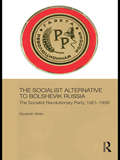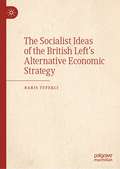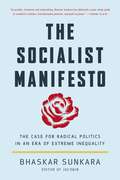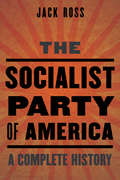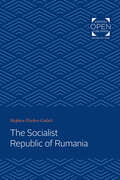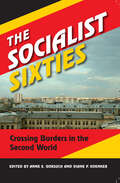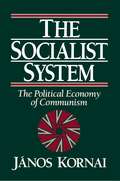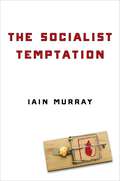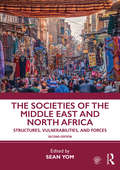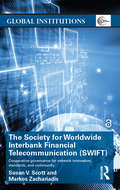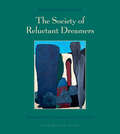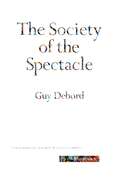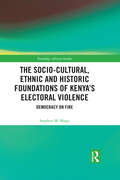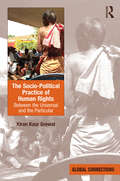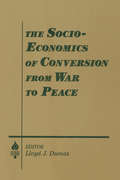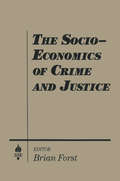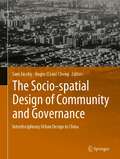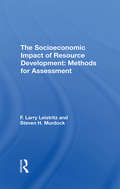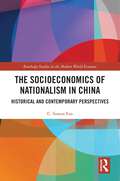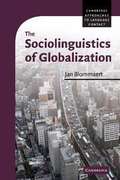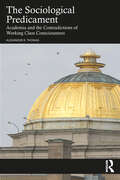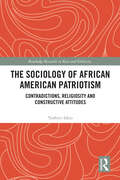- Table View
- List View
The Socialism of Fools?
by William I. BrusteinAnti-Semitism, as it has existed historically in Europe, is generally thought of as having been a phenomenon of the political right. To the extent that nineteenth- and early twentieth-century leftist movements have been found to manifest anti-Semitism, their involvement has often been suggested to be a mere fleeting and insignificant phenomenon. As such, this study seeks to examine more fully the role that the historic European left has played in developing and espousing anti-Semitic views. The authors draw upon a range of primary and secondary sources, including the analysis of left- and right-wing newspaper reportage, to trace the relationship between the political left and anti-Semitism in France, Germany, and Great Britain from the French Revolution to World War II, ultimately concluding that the relationship between the left and anti-Semitism has been much more profound than previously believed.
The Socialist Alternative to Bolshevik Russia: The Socialist Revolutionary Party, 1921-39 (BASEES/Routledge Series on Russian and East European Studies)
by Elizabeth WhiteThe Socialist Revolutionary party, which had been the largest and most popular party in Russia in 1917, did not after the October Revolution just disappear into the "dustbin of history", as Trotsky hoped, but – led by its leadership in exile in the 1920s and 1930s – continued to observe and comment on developments in Russia. In emigration, the Socialist Revolutionary (SR) party often put forward policy proposals on a wide range of topics: policies which, based on a shrewd understanding of the real situation in Russia, offered realistic alternatives to the policies being pursued by the Marxist Bolshevik regime. This book fills a gap in examining one of the most significant Russian political parties, and is based on extensive original analysis of SR party materials, shows how it operated; how it formulated and disseminated its ideas; what these ideas were, and how the party's ideas developed in response to changing circumstances in Russia and Europe more widely. Far from being the agrarian Slavophile romantics as they are often portrayed, this book shows the SRs were energetic European modernisers who contributed vigorously to the leading debates of their day; it also shows how the SR vision of a populist, socialist regime failed to materialise as state control, dictatorship and the collectivisation of agriculture took hold.
The Socialist Ideas of the British Left’s Alternative Economic Strategy
by Baris TufekciThis book provides the first book-length study of the political and economic ideas of the British left’s Alternative Economic Strategy in the 1970s and early 1980s. Discussing the AES’s approaches to capitalism, the nation state and the working class, it argues that existing academic accounts have significantly overstated the radicalism of the strategy. Perhaps more notable, especially in the light of its stated ‘revolutionary’ aims, was the extent of its moderation – its continuities with post-war Labour revisionism, its marked reluctance to look beyond the market economy, the degree of its preoccupation with Britain’s global-economic status, and its inability to break with Labourist politics of class co-operation in the national interest. While the book argues that the AES was the last ‘class politics’ socialist initiative in mainstream British politics, it also explores the ways in which its ideas perhaps prepared the way for New Labour in the 1990s, and its relationship with 'Corbynism' since 2015.
The Socialist Manifesto: The Case for Radical Politics in an Era of Extreme Inequality
by Bhaskar SunkaraFrom one of the most prominent voices on the American Left, a galvanizing argument for why we need socialism in the United States todayWith the stunning popularity of Bernie Sanders and Alexandria Ocasio-Cortez, Americans are embracing the class politics of socialism. But what, exactly, is socialism? And what would a socialist system in America look like? In The Socialist Manifesto, Bhaskar Sunkara explores socialism's history since the mid-1800s and presents a realistic vision for its future. The editor of Jacobin magazine, Sunkara shows that socialism, though often seen primarily as an economic system, in fact offers the means to fight all forms of oppression, including racism and sexism. The ultimate goal is not Soviet-style planning, but to win rights to healthcare, education, and housing, and to create new democratic institutions in workplaces and communities. A primer on socialism for the 21st century, this is a book for anyone seeking an end to the vast inequities of our age.
The Socialist Party of America: A Complete History
by Jack RossAt a time when the word “socialist” is but one of numerous political epithets that are generally divorced from the historical context of America’s political history, The Socialist Party of America presents a new, mature understanding of America’s most important minor political party of the twentieth century. From the party’s origins in the labor and populist movements at the end of the nineteenth century, to its heyday with the charismatic Eugene V. Debs, and to its persistence through the Depression and the Second World War under the steady leadership of “America’s conscience,” Norman Thomas, The Socialist Party of America guides readers through the party’s twilight, ultimate demise, and the successor groups that arose following its collapse.Based on archival research, Jack Ross’s study challenges the orthodoxies of both sides of the historiographical debate as well as assumptions about the Socialist Party in historical memory. Ross similarly covers the related emergence of neoconservatism and other facets of contemporary American politics and assesses some of the more sensational charges from the right about contemporary liberalism and the “radicalism” of Barack Obama.
The Socialist Republic of Rumania (Integration And Community Building In Eastern Europe)
by Stephen Fischer-GalatiOriginally published in 1969. Rumania faced the problem, shared by other independently minded communist states in the era of the Soviet bloc, of pursuing independent policies in foreign and intra-bloc relations and in its domestic affairs without provoking the Soviet Union to a military reaction. The efforts of the Rumanian leadership in this direction were aided by the fact that there was no politically relevant pro-Moscow elite that could take over if Ceausescu and his followers were deposed by force. Writing his study during the communist period, Professor Fischer-Galati concludes that the future of Rumanian integration into the communist party-state system hinges on the resolution of differences with the Soviet Union and that no meaningful reconciliation appears likely while the present Rumanian and Russian elites remain in power. The author believes, however, that the Rumanians will continue to pursue their independent course—one that could stimulate greater popular support and participation in the country's affairs, although it may not lead to a realization of Ceausescu's social nationalist goals.
The Socialist Sixties: Crossing Borders in the Second World
by Anne E. Gorsuch and Diane P. Koenker“A very engaging collection of essays that adds much to an evolving literature on the social history of the Soviet Union and broader socialist societies.” —ChoiceThe 1960s have reemerged in scholarly and popular culture as a protean moment of cultural revolution and social transformation. In this volume socialist societies in the Second World (the Soviet Union, East European countries, and Cuba) are the springboard for exploring global interconnections and cultural cross-pollination between communist and capitalist countries and within the communist world.Themes explored include flows of people and media; the emergence of a flourishing youth culture; sharing of songs, films, and personal experiences through tourism and international festivals; and the rise of a socialist consumer culture and an esthetics of modernity. Challenging traditional categories of analysis and periodization, this book brings the sixties problematic to Soviet studies while introducing the socialist experience into scholarly conversations traditionally dominated by First World perspectives.
The Socialist System: The Political Economy of Communism
by János KornaiTo understand the dramatic collapse of the socialist order and the current turmoil in the formerly communist world, this comprehensive work examines the most important common properties of all socialist societies. JNBnos Kornai brings a life-long study of the problems of the socialist system to his explanation of why inherent attributes of socialism inevitably produced in-efficiency. In his past work he has focused on the economic sphere, maintaining consistently that the weak economic performance of socialist countries resulted from the system itself, not from the personalities of top leaders or mistakes made by leading organizations and planners. This book synthesizes themes from his earlier investigations, while broadening the discussion to include the role of the political power structure and of communist ideology. Kornai distinguishes between two types, or historical phases, of socialism. The "classical socialism" of Stalin, Mao, and their followers is totalitarian and brutally repressive, but its components fit together and make up a coherent edifice. Associated with names like Tito, KNBdar, Deng-Xiaoping, and Gorbachev, "reform socialism" relaxes repression, but brings about a sharpening of inner contradictions and the eventual dissolution of the system. Kornai examines the classical system in the first half of the book, and moves on to explore the complex process of reform in the second half. The Socialist System is addressed to economists in the first place, but also to political scientists, sociologists, and historians. In addition, it will appeal to policymakers, business analysts, and government officials who need to understand either formerly or presently communist countries.
The Socialist Temptation
by Iain MurraySocialism is tempting, seductive, alluring. It comes in many forms and speaks in many different ways. It appeals to people who value fairness, who value freedom, and who value security. It comes in many varieties, sometimes clothing itself in the dress of nationalism, sometimes in the garb of environmentalism. Yet there is one single, unifying feature – subjugation of the individual to the collective. While Americans have always been skeptical of socialism, even in the progressive and New Deal eras, that is beginning to change. Large numbers of Americans now express admiration for socialism, and similar numbers are critical of the free enterprise system. The problem is particularly acute among America&’s young people. This is not the first time we have been here. In 1977, when America was deep in an economic malaise, Ronald Reagan gave a speech in which he wondered, &“Whatever happened to free enterprise?&” Noting that the free enterprise system &“for 200 years made us the light of the world,&” he warned that freedom is &“never more than one generation away from extinction.&” He took the lead in preserving it for the previous generation. It is time for this generation to take up the torch. Reagan framed the defense of freedom as first and foremost a communications challenge. Today, a field of study known as cultural cognition theory understands that our political choices are guided by certain values. Americans generally fall into one of three value groups, valuing fairness (egalitarians), freedom (libertarians), and security (conservatives) respectively. The Socialist Temptation is an attempt to meet the modern version of the communications challenge posed by Ronald Reagan. There are reasons why socialism appeals to each of these value groups. The Socialist Temptation tackles these reasons head on and responds with a vigorous case for free enterprise as better matching American values.
The Societal Foundations of National Competitiveness (RR ; #A499-1)
by Michael J. MazarrNations rise and fall, succeed or fail in rivalries, and enjoy stability or descend into chaos because of a complex web of factors. One critical component is a nation’s essential social characteristics. This report examines the characteristics of highly competitive societies, explores the relationship of a nation’s social condition to its global standing, and then applies these lessons to the United States today.
The Societies of the Middle East and North Africa: Structures, Vulnerabilities, and Forces
by Sean YomThe second edition of this well-regarded volume explores the societies of the Middle East and North Africa. Presenting original studies written by the world’s leading MENA scholars, it sheds light upon the organizing structures, human vulnerabilities, and dynamic forces that propel social change among the peoples of the Arab world, as well as Israel, Turkey, and Iran. The volume can be used in conjunction with The Government and Politics of the Middle East and North Africa textbook for a comprehensive overview of the region. Carrying over from the previous edition, among the rich topics covered are agriculture, urbanization, development, identity, citizenship, gender, religion, civil society, the environment, and youths. This second edition adds two new chapters on refugees and public opinion, as each constitutes a crucial part of the region’s social and cultural context. This edition also updates existing chapters to account for the latest events and trends, including the COVID-19 pandemic, popular protests, and demographic growth. Written in an accessible way, the chapters are clearly structured and contain insightful analysis, memorable case studies, illustrative photographs, and visualized data that illuminate the contours of social life across this diverse region. Each chapter also ends with curated questions for discussion, followed by annotated bibliographies to help spark further research to encourage seamless adoption into classrooms.
The Society for Worldwide Interbank Financial Telecommunication: Cooperative governance for network innovation, standards, and community (Global Institutions)
by Susan V. Scott Markos ZachariadisA PDF version of this book is available for free in open access via www.tandfebooks.com as well as the OAPEN Library platform, www.oapen.org. It has been made available under a Creative Commons Attribution-Non Commercial-No Derivatives 3.0 license and is part of the OAPEN-UK research project. This book traces the history and development of a mutual organization in the financial sector called SWIFT, the Society for Worldwide Interbank Financial Telecommunication. Over the last forty years, SWIFT has served the financial services sector as proprietary communications platform, provider of products and services, standards developer, and conference organizer ("Sibos"). Founded to create efficiencies by replacing telegram and telex (or ‘wires’) for international payments, SWIFT now forms a core part of the financial services infrastructure. It is widely regarded as the most secure trusted third party network in the world serving 212 countries and over 10,000 banking organizations, securities institutions and corporate customers. Through every phase of its development, SWIFT has maintained the status of industry cooperative thus presenting an opportunity to study broader themes of globalization and governance in the financial services sector. In this book the authors focus on how the design and current state of SWIFT was influenced by its historical origins, presenting a comprehensive account in a succinct form which provides an informative guide to the history, structure, activities and future challenges of this key international organization. This work will be of great interest to students and scholars in a wide range of fields including IPE, comparative political economy, international economics, business studies and business history.
The Society of Equals
by Pierre RosanvallonSince the 1980s, societys wealthiest members have claimed an ever-expanding share of income and property. It has been a true counterrevolution, says Pierre Rosanvallon--the end of the age of growing equality launched by the American and French revolutions. And just as significant as the social and economic factors driving this contemporary inequality has been a loss of faith in the ideal of equality itself. An ambitious transatlantic history of the struggles that, for two centuries, put political and economic equality at their heart, "The Society of Equals" calls for a new philosophy of social relations to reenergize egalitarian politics. For eighteenth-century revolutionaries, equality meant understanding human beings as fundamentally alike and then creating universal political and economic rights. Rosanvallon sees the roots of todays crisis in the period 1830-1900, when industrialized capitalism threatened to quash these aspirations. By the early twentieth century, progressive forces had begun to rectify some imbalances of the Gilded Age, and the modern welfare state gradually emerged from Depression-era reforms. But new economic shocks in the 1970s began a slide toward inequality that has only gained momentum in the decades since. There is no returning to the days of the redistributive welfare state, Rosanvallon says. Rather than resort to outdated notions of social solidarity, we must instead revitalize the idea of equality according to principles of singularity, reciprocity, and communality that more accurately reflect todays realities.
The Society of Reluctant Dreamers
by Jose Eduardo AgualusaSplitting through the clear waters beside the rainbow hotel, Daniel Benchimol finds a waterproof mango-yellow camera and uncovers the photographed reveries of a famous Mozambican artist, Moira. In this exquisite new novel, Agualusa's reader loses all sense of reality.In The Society of Reluctant Dreamers, Daniel dreams of Julio Cortázar in the form of an ancient giant cedar, his friend Hossi transforming into a dark crow, and most often of the Cotton-Candy-Hair-Woman, Moira, staring right back at him. After emails back-and-forth, Moira and Daniel meet, and Daniel becomes involved in a mysterious project with a Brazilian neuroscientist, who's creating a machine to photograph people's dreams. Set against the dense web of Angola's political history, Daniel crosses the hazy border between dream and reality, sleepwalking towards a twisted and entirely strange present.
The Society of the Spectacle
by Guy DebordFew works of political and cultural theory have been as enduringly provocative as Guy Debord’s Society of the Spectacle. From its publication amid the social upheavals of the 1960s to the present, the volatile theses of this book have decisively transformed debates on the shape of modernity, capitalism, and everyday life in the late twentieth century. Now finally available in a superb English translation approved by the author, Debord’s text remains as crucial as ever for understanding the contemporary effects of power, which are increasingly inseparable from the new virtual worlds of our rapidly changing image / information culture. <P><P>“In all that has happened in the last twenty years, the most important change lies in the very continuity of the spectacle. Quite simply, the spectacle’s domination has succeeded in raising a whole generation moulded to its laws. The extraordinary new conditions in which this entire generation has lived constitute a comprehensive summary of all that, henceforth, the spectacle will forbid; and also all that it will permit.”— Guy Debord (1988)
The Socio-Cultural, Ethnic and Historic Foundations of Kenya’s Electoral Violence: Democracy on Fire (Routledge African Studies)
by Stephen M. MaguKenya’s 2007 General Election results announcement precipitated the worst ethnic conflict in the country’s history; 1,133 people were killed, while 600,000 were internally displaced. Within 2 months, the incumbent and the challenger had agreed to a power-sharing agreement and a Government of National Unity. This book investigates the role of socio-cultural origins of ethnic conflict during electoral periods in Kenya beginning with the multi-party era of democratization and the first multi-party elections of 1992, illustrating how ethnic groups construct their interests and cooperate (or fail to) based on shared traits. The author demonstrates that socio-cultural traditions have led to the collaboration (and frequent conflict) between the Kikuyu and Kalenjin that has dominated power and politics in independent Kenya. The author goes onto evaluate the possibility of peace for future elections. This book will be of interest to scholars of African democracy, Kenyan history and politics, and ethnic conflict.
The Socio-Political Practice of Human Rights: Between the Universal and the Particular (Global Connections)
by Kiran Kaur GrewalThis book examines discourses of rights and practices of resistance in post-conflict societies, exploring the interaction between the international human rights framework and different actors seeking political and social change. Presenting detailed new case studies from Sierra Leone, Sri Lanka and Kosovo, it reveals the necessity of social scientific interventions in the field of human rights. The author shows how a shift away from the realm of normative political or legal theory towards a more sociological analysis promises a better understanding of both the limits of current human rights approaches and possible sites of potential. Considering the diverse ways in which human rights are enacted and mobilised, The Socio-Political Practice of Human Rights engages with major sites of tension and debate, examining the question of whether human rights are universal or culturally relative; their relationship to forms of economic and political domination; the role of law as a mechanism for social change and the ways in which the language of human rights facilitates or closes sites of radical resistance. By situating these debates in specific contexts, this book concludes by proposing new ways of theorizing human rights. Empirically grounded and offering an alternate framework for understanding the fluid and ambiguous operation of power within the theory and practice of human rights, this volume will appeal to scholars of sociology, law and politics with interests in gender, resistance, international law, human rights and socio-legal discourse.
The Socio-economics of Conversion from War to Peace (Studies In Socio-economics)
by Amitai Etzioni Lloyd J. DumasThis text discusses the economic, social and political implications of redirecting labour and capital from a military-based to a post-Cold War economy.
The Socio-economics of Crime and Justice (Studies In Socio-economics)
by Brian ForstThis book on crime and justice is motivated primarily by the idea that individual behaviour is influenced both by self-interest and by conscience, or by a sense of community responsibility. Forst has assembled a collection of authors who are writing in four parts: (1) the philosophical foundations and the moral dimension of crime and punishment; (2) the sense of community and the way it influences the problem of crime; (3) on offenders and offences; and (4) on the response of the criminal justice system.
The Socio-spatial Design of Community and Governance: Interdisciplinary Urban Design in China
by Sam Jacoby Jingru Cyan ChengThis book proposes a new interdisciplinary understanding of urban design in China based on a study of the transformative effects of socio-spatial design and planning on communities and their governance. This is framed by an examination of the social projects, spaces, and realities that have shaped three contexts critical to the understanding of urban design problems in China: the histories of “collective forms” and “collective spaces”, such as that of the urban danwei (work-unit), which inform current community building and planning; socio-spatial changes in urban and rural development; and disparate practices of “spatialised governmentality”. These contexts and an attendant transformation from planning to design and from government to governance, define the current urban design challenges found in the dominant urban xiaoqu (small district) and shequ (community) development model. Examining the histories, transformations, and practices that have shaped socio-spatial epistemologies and experiences in China – including a specific sense of community and place that is rather based on a concrete “collective” than abstract “public” space and underpinned by socialised governance – this book brings together a diverse range of observations, thoughts, analyses, and projects by urban researchers and practitioners. Thereby discussing emerging interdisciplinary urban design practices in China, this book offers a valuable resource for all academics, practitioners, and stakeholders with an interest in socio-spatial design and development.
The Socioeconomic Impact Of Resource Development: Methods For Assessment
by Steve H. Murdock F. Larry Leistritz F Larry LeistritzLarge-scale industrial and energy-development projects are profoundly affecting the social and economic climate of rural areas across the nation, creating a need for extensive planning information, both to prepare for the effects of such developments and to meet state and federal environmental impact assessment requirements. This book examines alternative methods of modelling the economic, demographic, public service, fiscal, and social impacts of major development projects. The authors provide a synthesis of the conceptual bases, estimation techniques, data requirements, and types of output available, focusing on models that address multiple impact dimensions and produce information at the county and subcounty levels. They also look at the kind of data each model produces in each impact category.
The Socioeconomics of Nationalism in China: Historical and Contemporary Perspectives (Routledge Studies in the Modern World Economy)
by C. Simon FanThis book analyzes Chinese nationalism from the perspective of social economics. It posits a conceptual framework in which national status is treated as a "luxury" while material consumption is considered as a "necessity" in people’s preferences, which implies that popular nationalism tends to increase with economic development. The book extensively uses the tools of game theory and behavioral economics to analyze inter-ethnical and international conflicts in historical and contemporary China. The author’s economic approach to the subject of nationalism brings fresh and critical insights into the Chinese historical events and relations with foreign countries. For example, it helps resolve the following puzzles: Why did most Chinese support an ethnic minority, the Manchus, to be their ruler after the collapse of the Ming dynasty? In the Boxer Rebellion, why did the Qing dynasty declare war against more than eight foreign powers when it knew well that any of the countries could defeat China easily? What are the fundamental causes of the 1962 Sino-Indian War and the 1979 Sino-Vietnamese War? Who is responsible for the bombing of the Chinese Embassy in Belgrade? This book attempts to answer the questions based on the theories of social economics and rational choice, which will interest those researching on nationalism, China studies, international relations, history and political economy.
The Sociolinguistics of Globalization
by Jan BlommaertHuman language has changed in the age of globalization: no longer tied to stable and resident communities, it moves across the globe, and it changes in the process. The world has become a complex 'web' of villages, towns, neighbourhoods and settlements connected by material and symbolic ties in often unpredictable ways. This phenomenon requires us to revise our understanding of linguistic communication. In The Sociolinguistics of Globalization Jan Blommaert constructs a theory of changing language in a changing society, reconsidering locality, repertoires, competence, history and sociolinguistic inequality.
The Sociological Predicament: Academia and the Contradictions of Working Class Consciousness
by Alexander ThomasA sociological phenomenon afflicts sociology itself: academics think of themselves as the vanguard of the working class despite the fact that they are not working class, as the noble willingness to side with the oppressed contrasts scholars’ reliance on authority to bolster their politics.While there are no simple solutions to this contradiction, a necessary beginning is for sociologists (and other academics) to acknowledge the reality of their own class privilege as members of the professional-managerial class. The Sociological Predicament is then a conscious and deliberate work of professional self-loathing that traces the evolution of ideologies found in academia from the mid-twentieth century to today, which demonstrates the ways in which biases around class have given short shrift to the concerns of working class Americans in deindustrialized cities and towns that have ultimately turned away from and then against them.Intellectuals have not historically been on the side of the oppressed but have been instrumental in developing ideologies that sustain the status quo, and this book crucially asks whether academics’ presence on the left ultimately serves conservative ends.
The Sociology of African American Patriotism: Contradictions, Religiosity and Constructive Attitudes (Routledge Research in Race and Ethnicity)
by Yoshito IshioThis book offers a sociological examination of the reasons why African Americans feel love toward their country in spite of continuing to perceive or experience racial prejudice and discrimination against themselves and other African Americans. Dr. Ishio conducted face-to-face, in-depth interviews with college-educated African Americans in Texas between 2014 and 2015. The main conclusion of this study is that contradictory trends marked by persistent racism and racial progress, combined with the effects of Christian faith/practice fostered in the Black Church and the effects of foundational principles of the United States, have molded a distinctive form of patriotism among African Americans for whom this country is their homeland. This book presents an insightful analysis by a Japanese sociologist.Every important finding in this book is supported by interviewees’ statements, making it easy for readers to follow the points being made and to understand African Americans’ perspectives. Numerous interviewees’ statements are judiciously inserted so that readers can virtually “hear” interviewees’ voices describing their experiences and views.A unique study of African Americans and their feelings of patriotism, it will appeal to scholars and researchers with interests in the sociology of race and ethnicity, Black studies, and the sociology of religion.

